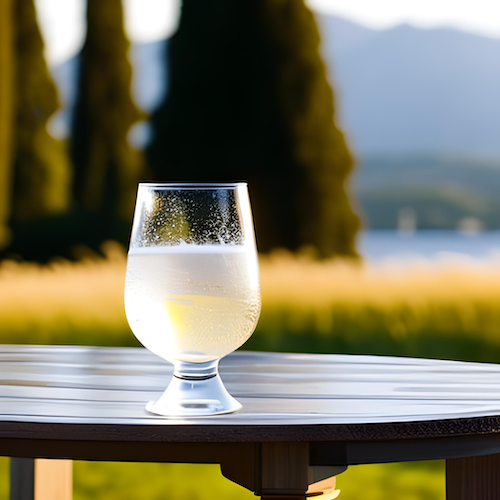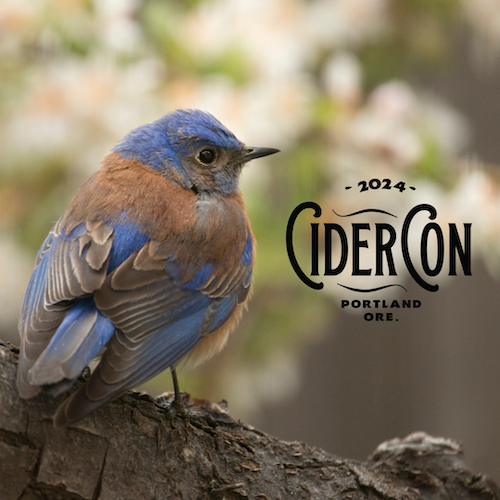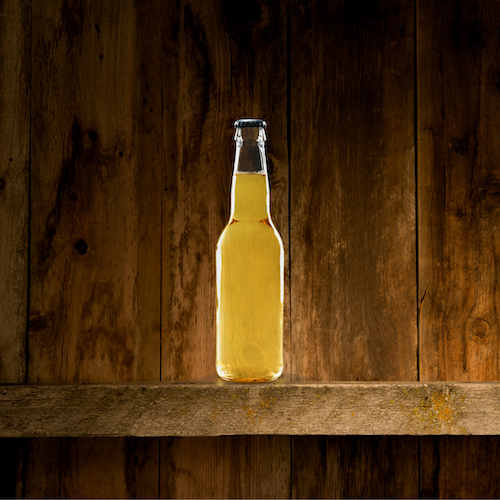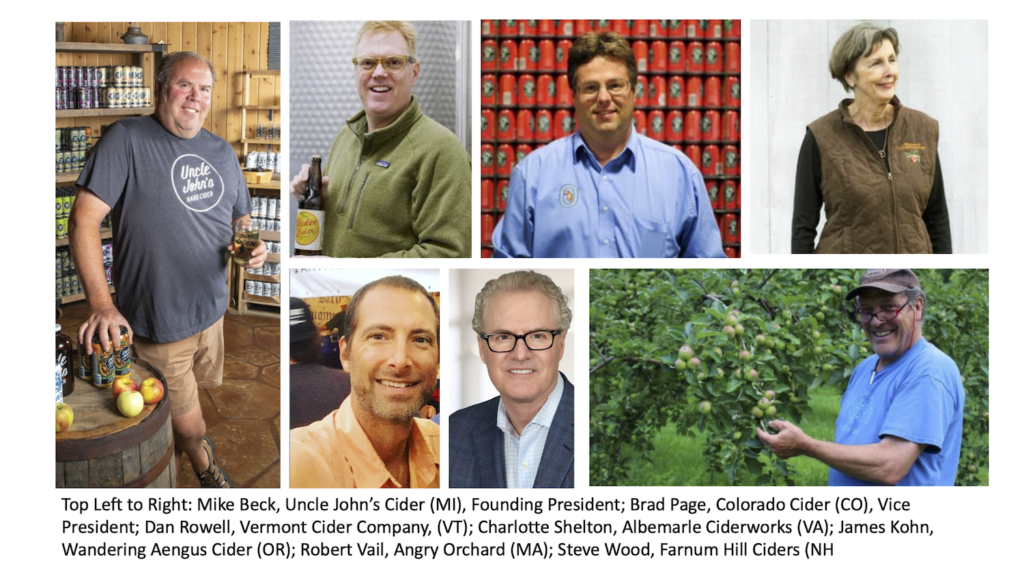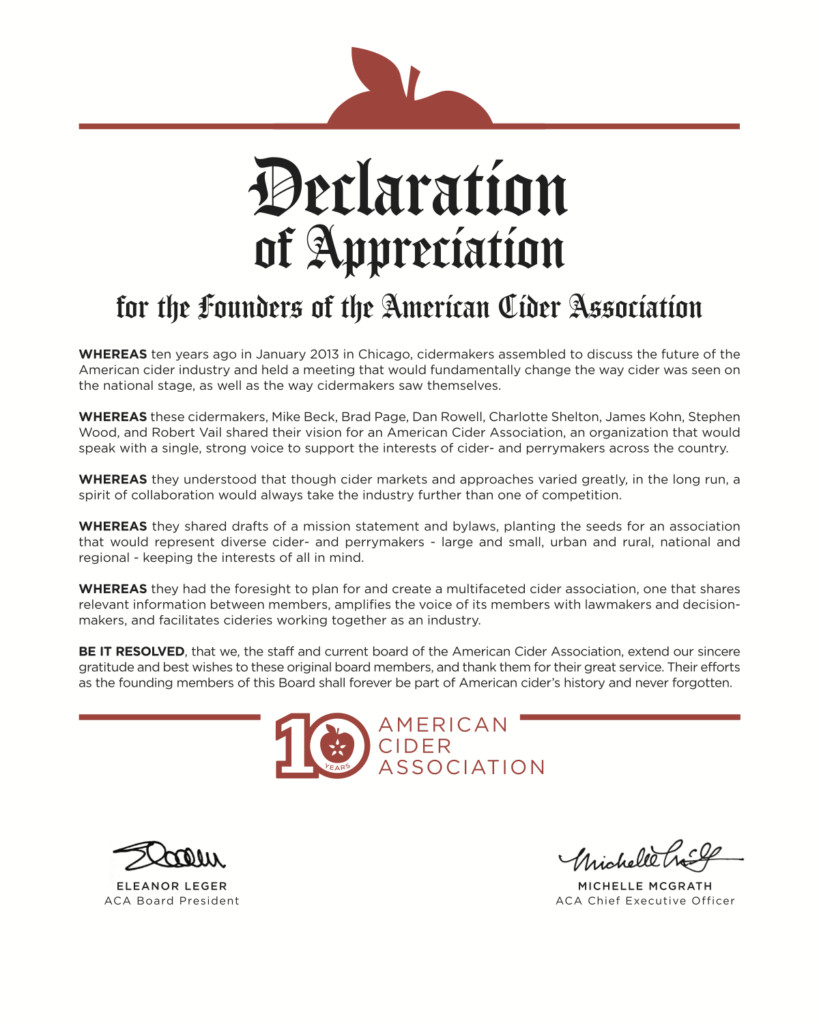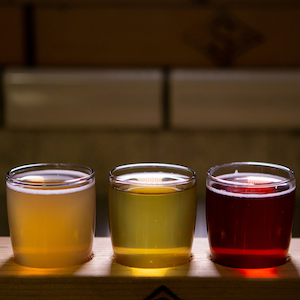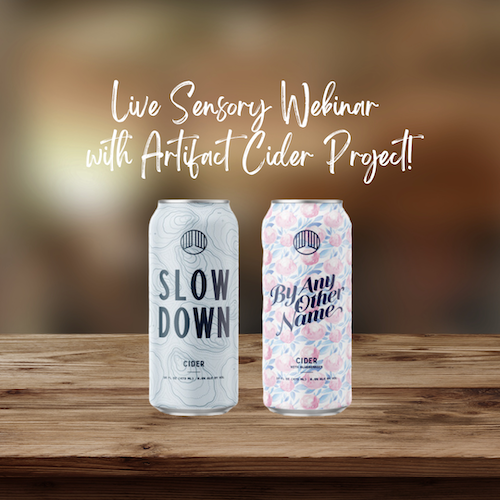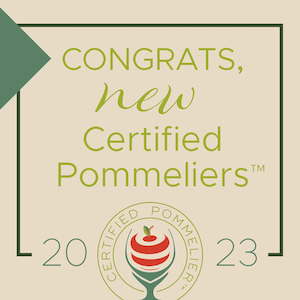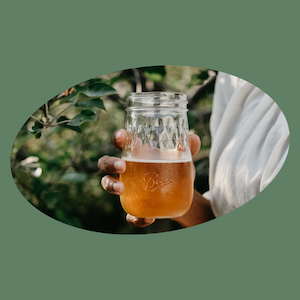Posts Tagged ‘home’
New ACA Member Benefits!

We’re excited to share some new ACA member benefits with you this spring. Read on to learn more about our brand new resource hub, the new 3 Tier Beverages dashboard just released with Nielsen Q1 2023 data, and a free Crafted for All account now available to all members.
Resource Hub
We’re so excited to share that our new digital Resource Hub is now live! The resource hub is exclusively for ACA members and is filled with items useful for cider businesses of all sizes. The resource hub already includes a wealth of information and members can expect a quarterly release of new resources and will be notified via email when these updates occur.
Nielsen Q1 2023 Data on New 3 Tier Beverages Dashboard
3 Tier Beverages, in partnership with NielsenIQ, is proud to be the official data supplier of the American Cider Association. Part of this partnership brings you quarterly dashboards with key market data and insights to help you drive your business forward. The first dashboard is now available with data through Q1 2023 (3/25/23).
Crafted for All Account
We’ve had the privilege of working with Dr. J Nikol Jackson-Beckham and her organization Crafted for All for several years now and we’re so pleased to be able to expand our partnership and offer all ACA members the opportunity to create an account with Crafted for All where you’ll find a wealth of resources.
We’re Looking for Vendors for CiderCon® 2024
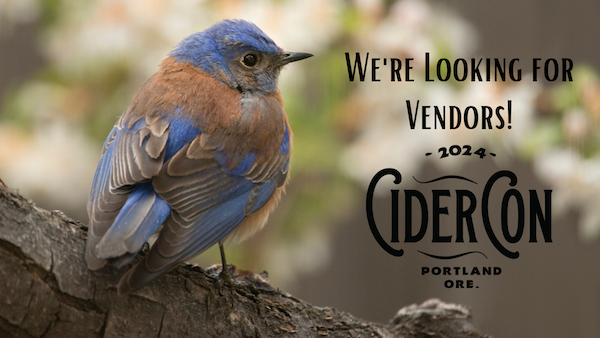
Did you know that the largest gathering of cider producers in the world is coming to Portland, Oregon next January for CiderCon® 2024? In addition to a wide range of educational sessions and events for cider producers, we also host an extensive trade show where our attendees can meet vendors with products and services that can help them thrive. CiderCon® 2024 will be held at the Oregon Convention Center from January 17-19 and the trade show will be right in the middle of it all. We haven’t been back to Portland since 2016, so we’re anticipating a great turn out!
If you haven’t been a vendor at CiderCon® before, now is the time to get involved and showcase your products and services to the rapidly growing cider industry. Our attendees always appreciate the chance to meet new vendors.
Have you already been a vendor at CiderCon®? Then you already know how much our attendees love the trade show and seek it out to connect with you!
Booth prices for CiderCon® 2024 are $3000 for a 10’ x 10’ space – and that includes 3 passes to the conference as well as lunch on Thursday and Friday!
Interested in joining us? Email our Trade Show Coordinator Ellen Husch for more information!
Know a company that you think would be a great fit? Send their contact information to Ellen.
There are also numerous sponsorship opportunities available for vendors. Supporting the American Cider Association is a great way to gain brand visibility at CiderCon® and beyond. There are a myriad of reasons why sponsoring the ACA works in your favor. We shout out our appreciation for our sponsors far and wide at CiderCon®, on our website, on social media and our members hear us. Our Executive Director Michelle McGrath is eager to work with you on creating a custom sponsorship experience that meets your brand’s personality and needs. Email Michelle to schedule a meeting.
Webinar: How Cideries Like Santa Cruz Cider Are Preventing Catastrophic Climate Change
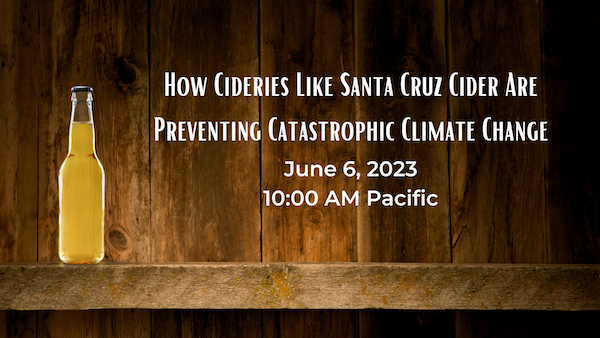
There are a significant number of reasons why cideries like Santa Cruz Cider are looking to become more sustainable. Agriculture health, ingredient accessibility, customer engagement, preserving the bottom line, and protecting the planet are all driving cideries to focus on sustainability.
Join Jenny Morgan from Tradewater and Nicole Todd of Santa Cruz Cider Co. on June 6 at 10:00 AM Pacific for a discussion of the ways that Santa Cruz Cider committed themselves to sustainable action and how they came to partner with Tradewater.
We will also dive deeper into the high-impact climate projects that Tradewater leads and how each cidery can do their part to prevent catastrophic climate change.
Interested in learning how you can take action on sustainability in your cidery? Download this PDF with suggestions from Tradewater.
Our Speakers

Jenny Morgan joined Tradewater in 2022 as the Market Development Manager. In her role, she partners with organizations to help achieve carbon neutrality through sustainability consultation, emissions reduction, and the purchase of carbon credits. She operates under the belief that our most challenging problems cannot be solved by government and nonprofits alone – it requires a collective effort. She is passionate in changing the way we view business and industry to be both profitable and purposeful. Prior to joining Tradewater, Jenny has worked within the technology and hospitality sectors, and comes with 15+ years of experience in Business Operations, Market Development, Events, and Community Engagement. Outside of work, Jenny enjoys spending time with her family and friends hiking, running, swimming, and planning themed celebrations.
Nicole’s love for cider started with a truck bed full of ‘found’ apples in a nearby orchard. Having a passion for fermenting anything she could get her hands on, she started Santa Cruz Cider Co. in 2013 with the help of her husband and her sister. They have built the company from the ground up on a shoestring budget with a hands on approach. Nicole lives on a historic apple orchard in Santa Cruz county with her husband and two dogs.
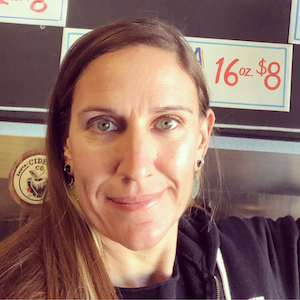
Resource Hub Now Available to ACA Members

The American Cider Association is pleased to announce the launch of a new digital Resource Hub. This resource hub is exclusively for ACA members and is filled with items useful for cider businesses of all sizes. There are several categories available to help members locate the resources they need. These categories include:
- Compliance & Taxes
- Market Data
- Marketing
- Making Cider
- Human Resources
- Sales
- Business
- Cider Pairing & Evaluation
- Apple Growing
The resource hub already includes a wealth of information and ACA staff will be continuing to add already created resources in the near future. In addition, members can expect a quarterly release of new resources and will be notified via email when these updates occur.
The resource hub also features a contact us button so that members can reach out to the ACA with suggestions for new resources they think would be helpful to them and fellow members.
You must be an active ACA member to access the Resource Hub. Click here to learn more about becoming a member today. Need to renew your membership? Login here to renew.
Declaration of Appreciation for Founding Members
Webinar: The Story Within the Story of Cider
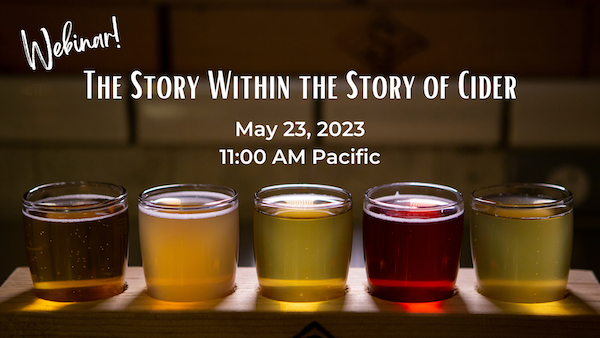
You’ve heard the headlines and the general trends for Cider. Join Brian “BK” Krueger and Dave Williams from Bump Williams Consulting on Tuesday, May 23, 2023 at 11:00 AM Pacific to dive in a little deeper and really take a look at the KPI’s that matter and how you can apply them to your own situation, presentations, insights, and decisions.
You can expect to hear more of the story on Cider Velocity, Runway for the Future, the Role of Flavor, Pack Size and Type, Innovation, Regional Power, and the Modern Bev Alc Consumer.
This webinar is for active ACA members only. Not a member? Join now!
Our Speakers

Brian “BK” Krueger graduated from the University of Texas, Austin in 1996 with a degree in Marketing – focusing on Strategic Marketing & Promotional Strategies. BK is a 24-year Industry Sales Leader with a distinguished and accomplished history of growth and development across multiple National and Regional Craft Breweries. Rising from New Belgium’s first “Texas Beer Ranger” in 1999, BK spent 17 years growing in parallel with New Belgium’s success and expansion and held the role of Assistant Director of Sales for 5+ Years. Leaving New Belgium in 2015, BK spent the next 4 years applying his knowledge, experience, and skill set to an extended selection of National and Regional Craft Breweries helping to evolve them into the modern and future world of Craft Beer. Joining Bump Williams Consulting in 2020, BK now applies his talents and expertise on Sales Systems and Structure, Portfolio Development, Distributor & Retailer Partnership, and Sales Strategy & Growth across the broad spectrum of Beverage Alcohol clients.

Dave Williams graduated from Penn State University in 2006 with a degree in Marketing. Dave began his career at Marketing Management Analytics (Ipsos MMA) as a Data Analyst, running sales regression models and market level analytics across various Retail and CPG clients. He left MMA and joined Nielsen in 2010, working up to the role of Client Manager. In this role, Dave led a team dedicated to Market Mix, Price/Promo and Consumer analysis for Procter & Gamble globally, spanning multiple categories and brands across their wide portfolio. In 2015, Dave left Nielsen to join Bump Williams Consulting where he currently runs high-end analytics across the Beverage Alcohol universe. His key focus areas include Consumer Behavior, Pricing, Promotion and Retail Landscape for BWC’s Supplier, Distributor and Retailer clients.
Live Sensory Webinar with Artifact Cider Project
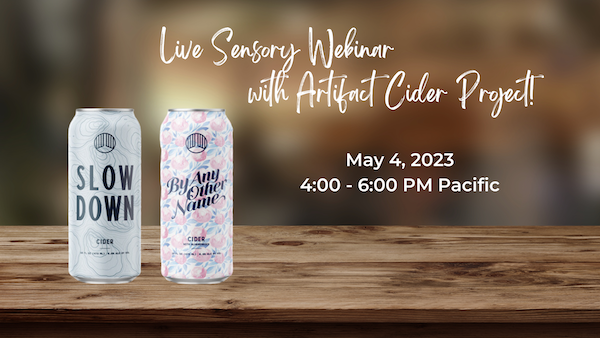
Join our Certified Pommelier™ panel in a live practice sensory webinar on May 4 from 4:00-6:00 PM Pacific featuring cider from Artifact Cider Project. This webinar will also be available to rewatch and practice as a prerecorded event.
Cider must be purchased separately. Please be aware that it may take several days to receive your cider order, so we encourage you to purchase your ciders as soon as possible. Also, please verify that cider can be sent to your state before purchasing ciders. Order the Certified Pommelier Study Sample Pack from Artifact to participate along with the webinar here.
Once registered, you will receive a confirmation email. This email is a placeholder for the event. The evening before the event you will receive an email with a Zoom link to the webinar. Please note this link will be sent to the registered email.
Three Upcoming ACA Webinars
The American Cider Association is pleased to share that we have several upcoming webinars in the next month and we hope you’ll join us at one or all of them. Read on to learn more about these webinars and to find links to register!

March 22 – 11:00 AM Pacific: 3 Tier Beverages Dashboard Orientation for ACA Members
3 Tier Beverages, in partnership with NielsenIQ, is proud to be the official data supplier of the American Cider Association. Part of this partnership brings ACA members quarterly dashboards with key market data and insights to help you drive your business forward. This webinar will walk ACA members through these dashboards so you can make the most of this unique offering. This webinar is for active ACA members only. Join now or renew your membership by clicking here.

March 24 – 9:30 AM Pacific: Coffee Chat with Vinoshipper: 2022 Cider Trends for Online Sales
Vinoshipper Senior Analyst Taylor Harrison will lead us through a look back at their data from 2022 and also provide a quick snap shot of what they’re seeing at the beginning of 2023 with regards to sales, packaging, and demographics! Want to check out some of the data before Taylor’s presentation? You can download it here. This webinar is open to all.
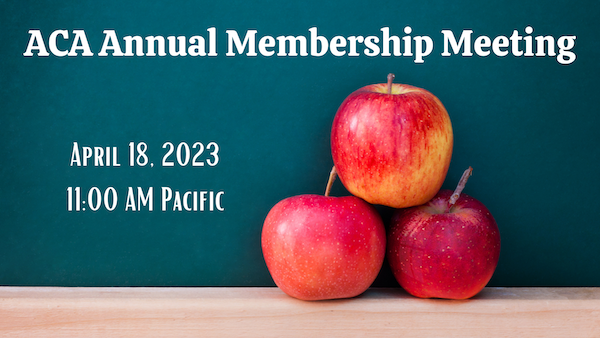
April 18 – 11:00 AM Pacific: ACA Annual Membership Meeting
The American Cider Association is pleased to invite our members to join us for the Annual Membership Meeting. We will review last year’s accomplishments, examine our strategic plan, and share what’s in the works for the year ahead. We look forward seeing all of you virtually and hearing your ideas for how we can promote the US cider industry. You must be an Active ACA Member to participate in the Annual Membership Meeting. You can join or renew your membership here.
ACA Welcomes 20 New Certified Pommeliers™ Following CiderCon® 2023

The American Cider Association is thrilled to announce that twenty people have newly earned the title of Certified Pommelier™ as a result of the exam held at CiderCon® 2023 in Chicago, Illinois last month. It is the largest passing cohort of any Certified Pommelier™ exam to date.
The new Certified Pommeliers™ are: Ann Marie Thornton of James Creek Cider House (NC), Anthony Lopez of Casa de Oro Cider (CA), Brian Wing, James Kerr & Khris Johnson of Green Bench Brewing (FL), Cam Workman of Schilling Cider (WA), Casey Simpson of Artifact Cider Project (MA), Danny Dispo of Hydraulic Hearth (NY), David Lugo of the Clyde Theatre (IN), Deirdre Birmingham of The Cider Farm (WI), Geoff Happel (NC), Ian Niblock (VA), Karl Hartdegen (NC) & Max Finnance (CT) of Bold Rock Hard Cider, Janelle Balsillie of Carolinia Cider Company and Heeman’s Cidery and Meadery (ON), Joseph Nosse of Frontier Ciderworks (OH), Sarah Pozgay of Twin Cities Somms (MN), Walker Smith of Goldeneye Cider (WA), cidermaker Eric Gasser (CA), and cider enthusiast Brandon Buza (CA). You can learn more about our Certified Pommeliers™ on the ACA website.
Cider is a beautifully nuanced beverage with a diverse set of elements that are often less understood by food and beverage professionals. Certifications are increasingly used in the professional realm to set oneself apart as an individual with specialized knowledge, though cider is often covered in a cursory manner by most certification programs, if at all. This led the American Cider Association to establish its Certified Cider Professional (CCP) program to educate those on the front-line of cider sales. Today it is the world’s most comprehensive and in-depth cider certification program for beverage professionals.
The Certified Cider Professional program began with a Level 1 certification to help those in the industry develop a fundamental understanding of cider. The Certified Pommelier™ certification was developed to move beyond a fundamental understanding and to encourage cider professionals to think critically while demonstrating a higher understanding of the elements of cider. The rigorous test consists of five types of questions: short answer, fill in the blank, matching, essay and blind sensory (based on tasting). Test questions fall into seven categories: Apples, the Orchard & History, Cidermaking, Evaluation, Families & Flavor, Keeping & Serving, Food & Cider and Social Responsibility.
“To see twenty people pass the Certified Pommelier™ exam in one sitting is remarkable for many reasons,” says Michelle McGrath, CEO of the ACA. “People are valuing the Certified Pommelier™ designation and putting in the hard work of preparing for the exam. It’s exciting to watch ACA’s cider appreciation program grow and succeed.”
While the Certified Pommelier™ exam is designed to be challenging, the ACA is dedicated to making sure all the information tested on is accessible to those desiring to learn. To that end, the ACA recently announced the release of their new textbook to help candidates prepare to take the exam. Those interested in preparing for the exam can purchase the new textbook through Kindle Direct Publishing. In addition, sensory analysis practice webinars and a Facebook study group are continually being updated with resources for candidates studying for the exam. Links to all CCP resources can be found on the ACA’s website.
“We have seen a huge advantage for candidates that utilize the study aides we make available,” states Jennie Dorsey, ACA’s Cider Education Outreach Manager. “We’ve also witnessed new professional connections form through ACA prep-webinars and informal study groups. It’s exciting to see networking as one of the CCP program’s many positive impacts on the cider community.”
The ACA asks that you contact Cider Education Outreach Manager Jennie Dorsey if you have questions about the program or are interested in taking either the Level 1 Certified Cider Professional test or the Certified Pommelier™ exam.
The next Certified Pommelier™ exam will be scheduled for the Bay Area of California in September, and more tests dates will be announced shortly. You can also learn more at https://ciderassociation.org/certification.
###
Celebrating Women’s History in the Cider Industry
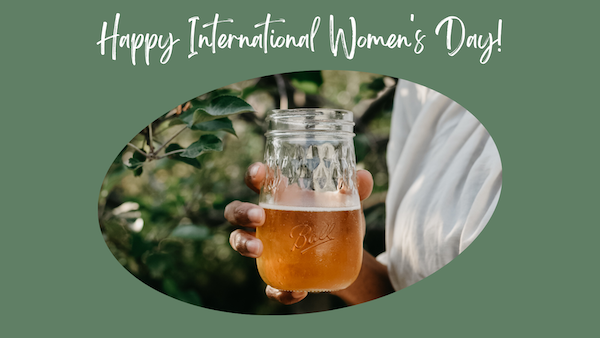
Happy International Women’s Day!
What is this day for? International Women’s Day is a day to bring awareness to the lack of gender equity on our planet. Where does the U.S. fall in gender equity progress? The gender gap in pay is one measure of dynamic inequalities–just last year, U.S. “women earned 82% of what men earned, according to a new Pew Research Center analysis of median hourly earnings of both full- and part-time workers.” (Pew Research) Researchers also found that this number hasn’t changed much in 20 years.
As a cider industry, we can take steps to ensure we are part of progress on gender equity. Here are a few ways your cidery can lead the way on gender equity in hiring and HR:
- Post all jobs with a pay rate.
- Avoid using gendered pronouns in job descriptions.
- Evaluate your pay scales for equality–are people earning the same wage for similar positions?
- Use established skill-based assessments to promote.
- Invest in making sure your company and your establishment are taking proactive steps to prevent gender-based violence and discrimination.
- Increase women and non-binary representation in leadership and decision-making teams.
In what ways are you promoting gender equity at your cidery?
Did you miss Dr. J’s presentation at CiderCon® on Retaining Great Talent? Her tips are useful for recruiting and retaining a talented gender-diverse workforce. Check out her slides here.
Celebrate Women’s Voices
The cider industry has an extremely talented community of women doing incredible work. We’re celebrating International Women’s Day by sharing some of their stories with you. And to double the celebration–all these stories were written by women beverage journalists and storytellers! Enjoy this collection of recent publications by women, about women, and for cider!*
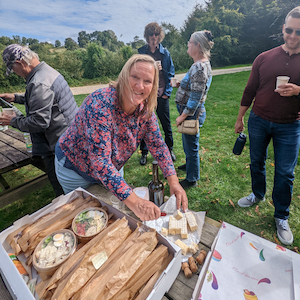
Cider Chat Podcast by Ria Windcaller –ACA 2023 Significant Impact Winner
Prohibitchin’ Newsletter by Beth Demmon
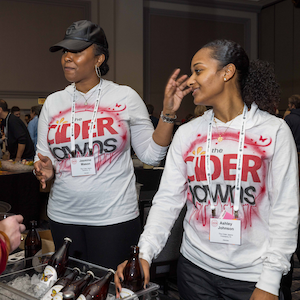
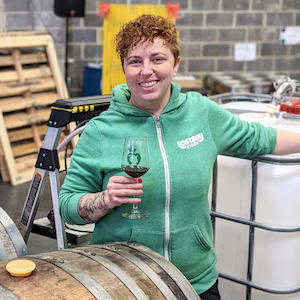
Courage and Other C Words by Jenn Martell
Cider Culture
- Cidermaker Q&A: DOPE Cider House and Winery with Malaika Tyson –ACA 2023 Significant Impact Winner
- Women Making Waves in the Cider World: Elizabeth Ryan of Hudson Valley Farmhouse Cider by Malaika Tyson
- Women Making Waves in the Cider World: Gretchen Esbensen of Shoal Draft Cider by Malaika Tyson

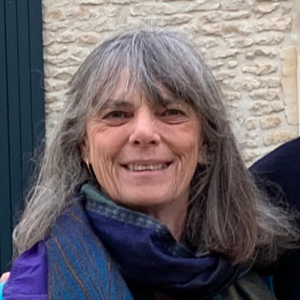
CiderCraft Magazine
- Meriwether’s Taproom Manager Mixes it Up on Netflix Series by Molly Allen
- Book Review: The Lost Orchards by Liz Copa by Darlene Hayes –ACA 2020 Significant Impact Winner
- 4 Questions with Elle Correll, Co-Owner of Buskey Cider by Stasia Brewcynski
And Some Women-Created Stories About Apples That We Love:
- From Apples to Fromage: 5 episodes of cheese and cider pairing goodness from Talia Haykin and Colleen Vidlocker
- Apple of My Eye: Foxwhelp by Lily Waite for Pellicle Magazine
- Stoke Red: Small-Town Apple Wins Big Competition by Darlene Hayes for Cidercraft Magazine

*Friendly reminder cider members–make sure you have Michelle McGrath on your press list. We want to elevate your press!

